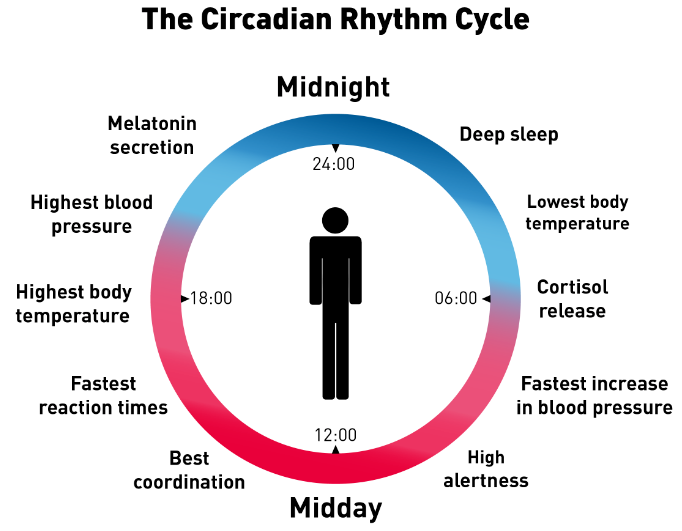Are you curious about if your body tells you when it’s feeling exhausted and when it should be more alert? From closing your eyes at night and getting up to your alarm at the crack of dawn It’s easy to think that we are in complete control over our sleeping habits.
While we make small decisions on a daily basis about rest however, each of us has a biological system encoded in our DNA that gives us the final say in the circadian cycle.
What exactly is this as well as how can it impact our sleeping patterns?
In this blog we will go deeper into the topic and examine how the circadian rhythm plays an impact on the way we sleep and how long.
What is the circadian rhythm?
To put it in simple phrases the circadian rhythm can be described as your internal clock that controls the time when your brain determines if you’re asleep and when you’re alert.
The circadian cycle can last for around 24 hours. This is the reason you tend to feel more alert or tired during the same time each day. In general, adults notice a drop in their energy levels throughout the evening (around between 2 and 4 am) and then shortly in the afternoon after lunch (12pm-3pm) however these are less noticeable in the event that you’ve completed your rest, and will be more apparent if you’re not taking enough.

What is the circadian rhythm? function?
A particular portion of your brainknown as the hypothalamus – is responsible for controlling the circadian cycle. In this almond-shaped part is the suprachiasmatic nuclear nucleus (SCN) which is located just over the optic nerve in which it reacts to certain triggers, including various degrees of light.
If the dark is seen by your eyes the eyes transmit a signal to your SCN telling it that it’s time to get exhausted and ready for a nap. In response the brain releases melatonin, which is a hormone that causes the sensation of tiredness. However, the boosts in alertness can be attributed to an increase in cortisol, a stress hormone, when the light source is detected.
It’s important to note that this process isn’t only dependent on vision since all cells within your body are equipped with biological clocks, which are kept on time by the SCN making sure that everything operates in perfect sync.
In a normal day your circadian rhythm will follow this pattern:
- 6-9:30 am: Your body begins to get ready for the day.
- 9am-12pm Brain activity reaches maximum alertness due to the increase in cortisol.
- 12pm – 3pm Drowsiness after lunch caused by digestion of food.
- 3PM-6PM: Body is in its best condition for vigorous activities.
- 6pm-9pm Your body is able to process food and which leads to a rise in blood pressure and temperature.
- 9pm-12am Brain signals to sleep through the production of the hormone melatonin.
- 12-AM-3AM: The body shuts itself down to rest.
- 3am-6am The body is sleeping Melatonin production is slowing as dawn gets closer.

What does the circadian rhythm have to do with sleep?
You can clearly see that your circadian rhythm and the sleep cycle are so tightly linked that they’re almost interdependent. Because they are both dependent on each other and if there is any disruption to the quality of your sleep or your bodily clocks, they could cause a knock-on effect.
It is apparent when you travel around the globe and time zones. You know it’s an entirely different time, and you put off or accelerate your sleep, however your circadian rhythm is connected to your normal routine at home, which is why you feel tired but not in the right time or wakefulness, which is known as jetlag.
It could also occur in the event that you are working night shifts and have to adjust to a totally new schedule of sleep Read our strategies for managing your night shift sleep in the event that this is something you’re dealing with.
It is also believed to be long-term health issues that may arise when your circadian rhythm has been disrupted for a long time and causes diabetes, obesity, depression and dementia.
Is there anything that can be done to help strengthen your circadian rhythm?

If your circadian rhythm is disrupted, there is a way to get it back on track and going from strength-to-strength. The most effective method for accomplishing this is to adhere to a consistent sleep routine which means you sleep and wake to the exact times each day and night (including weekend days).
It is possible to reinforce this further by participating in activities that help reinforce the idea of awakening and slumbering within your mind. It could be taking an exercise in the morning or bathing before getting ready for bed and both will bring you back to the routine of winding down or up.
Being exposed to even more natural light than you normally do has been proven to help reset the circadian rhythm. This is particularly important as you try to set your body’s clock to work again. Going for long walks outdoors or camping are two methods to achieve this.

